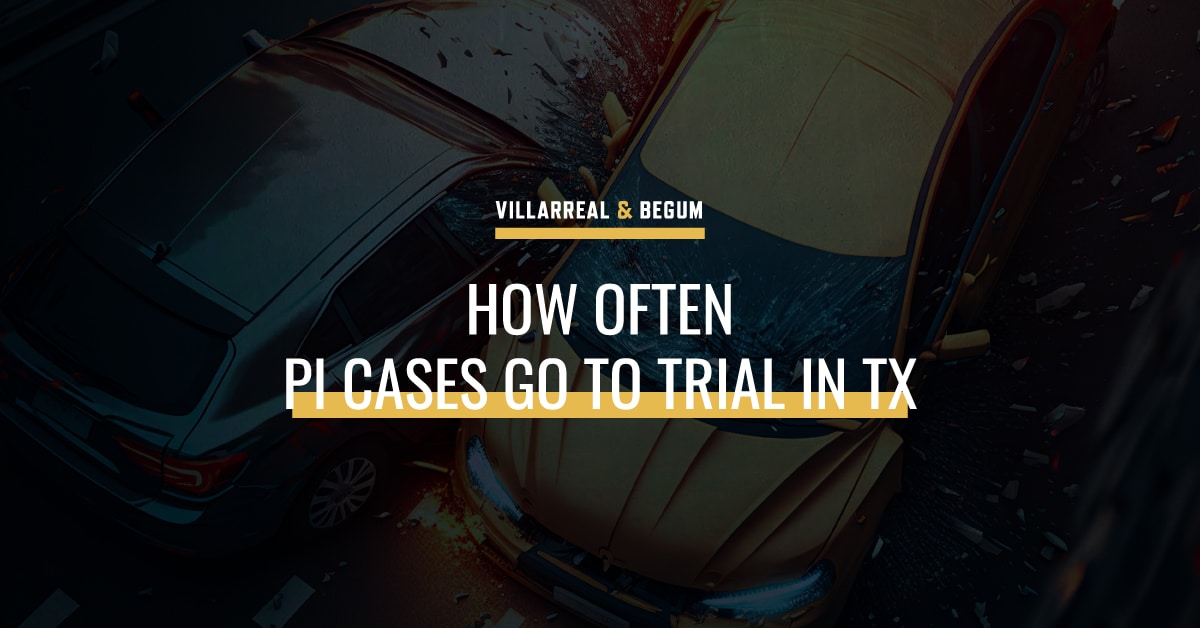Financial worries are common in personal injury cases. The more serious your injuries, the higher your current and future medical bills will be. You’ll also likely be out of work for a lot longer (provided you can ever work again). How will you manage to pay for your medical care and take care of your family?
With these types of concerns, you may wonder whether your case will settle, which generally happens more quickly, or go to trial for months or years. How often do Texas personal injury cases go to trial? At the Villarreal & Begum, LAW GUNS, we hear this question so often from clients that we’re dedicating a blog to the answer.
Most Texas Personal Injury Cases Do Not Go to Trial
You’ve probably heard that the vast majority of personal injury lawsuits filed never go to trial. This is generally true: between 90 and 95% of all cases settle outside the courtroom. Whether or not your case is an exception will depend on a number of factors, including those below:
- Injury Severity: The more serious your injuries, the more difficult it can be to reach a fair settlement, as there’s usually a lot of money involved. This is typically the case with traumatic brain injuries, spinal cord injuries, and other long-term conditions. Insurers have more to lose in these cases and often try to minimize your payout.
- Evidence Quality: Having strong evidence that’s hard to refute might encourage an insurance adjuster to settle since the trial outcome may be more predictable. Juries may also be inclined to award punitive damages in cases where extreme negligence is involved, adding hundreds of thousands of dollars to your award.
If you’re planning to file a lawsuit after a car accident, slip and fall, oil field accident, or other injury accident, it’s important to work with a personal injury lawyer in Austin, TX who’s also a skilled negotiator. Our firm’s attorneys have helped several clients successfully resolve their personal injury claims at the negotiation table and, when necessary, in court.
What Happens During a Personal Injury Trial in Texas?
While few personal injury cases go to trial in Texas, those that do follow a particular series of steps.
Depending on whether you have a bench or jury trial, a judge or jury will hear and review the evidence and decide whether the defendant was negligent. If they find that negligence led to the accident, they will then decide how much money to award you for your damages.
Jury Selection
Many personal injury trials in Texas start with jury selection, which is also called ‘voir dire.’ Potential jurors will be questioned by the attorneys representing both parties to determine whether they hold any opinions or beliefs that might prevent them from being fair or impartial if they are selected to serve on the jury. Both sides will eliminate or strike jurors that they believe cannot be fair and impartial. Depending on the court, between six and twelve potential jurors will be selected to hear your case.
Opening Statements
The lawyers for each side will present their opening arguments after the jury has been selected. An opening statement provides the judge or jury with an overview of the evidence and testimony that the lawyer intends to introduce over the course of the trial, along with the reason why they believe their side will succeed.
First, your attorney will explain how the accident occurred, why the defendant is liable for your injuries, and how the defendant’s negligence led to your injuries. After that, the defendant’s attorney will present facts and evidence suggesting that the defendant either didn’t cause the accident or that you weren’t as badly injured as you claim.
Witness Testimony and Cross-Examination
Once opening arguments are complete, your personal injury lawyer will call and question your witnesses, who will respond after being sworn in. This process is called a direct examination. Once they finish questioning each witness, the opposing attorney is entitled to cross-examine the witness about the testimony that they provided.
This is also the time when both sides introduce their exhibits, which may include medical records, accident and injury photos, video evidence, and more. They will explain to the court or jury why the evidence is significant and how it supports their position.
Closing Arguments
Once each side has completed its case, the attorneys will present closing arguments. Unlike opening arguments, which introduce the facts, closing arguments allow the lawyers to explain why their side should win the case. Your lawyer will:
- Detail why the judge or jury should decide in your favor
- Indicate how much money you should be awarded as compensation for your economic and non-economic losses
Since your side has the burden of proof, your lawyer will make their closing argument first and have the chance to rebut any assertion made by the defendant’s lawyer made during their closing.
Jury Deliberations
Once closing arguments are over, the judge will provide the jury with instructions that will be applied and followed during deliberations, which is when the jury reviews the evidence and determines the verdict.
It is important to note that Texas district courts require nine out of 12 jurors to agree on the amount of damages to be awarded. In federal courts, however, the jury must agree unanimously on the amount of damages. If this doesn’t happen, it’s called a hung jury and your case will have to be tried again.
The Verdict
Verdicts are the jury’s final decisions on liability and damages. This is a legally binding decision that determines whether the defendant is liable for your injuries and, if they are, how much monetary compensation the defendant must pay you.
What Are The Pros and Cons of Going to Trial?
The biggest advantage of going to trial is that you could end up with more money than you would in a settlement, especially if your case qualifies for punitive damages. On the downside, trials usually take a lot longer than settlements and you could even lose your case, leaving you in a difficult financial situation.
Sometimes Personal Injury Cases Go to Trial for the Best Results
When financial issues become pressing, you’re naturally eager for the case to be resolved as quickly as possible. That being said, you also deserve a fair settlement for your injuries, and if it is not possible to achieve that through negotiation, you need a personal injury lawyer who is prepared, willing, and able to go to trial.
At the Villarreal & Begum, LAW GUNS, our lawyers are skilled negotiators who are always open to reasonable offers. However, if we believe a settlement offer is inadequate and the other side refuses to budge, we will take your case to court. In either case, our goal is always a result that serves your best interests. To schedule your free consultation with a lawyer at our firm, call (512) 800-0000 or contact us online.
Related:
Contingency Lawyers in San Antonio
Spinal Fusion After Accident: Lawsuits and Settlements
The Villarreal & Begum, LAW GUNS dedicates their time and effort towards helping people in Texas find justice for personal negligence encountered while living their normal, everyday lives.





